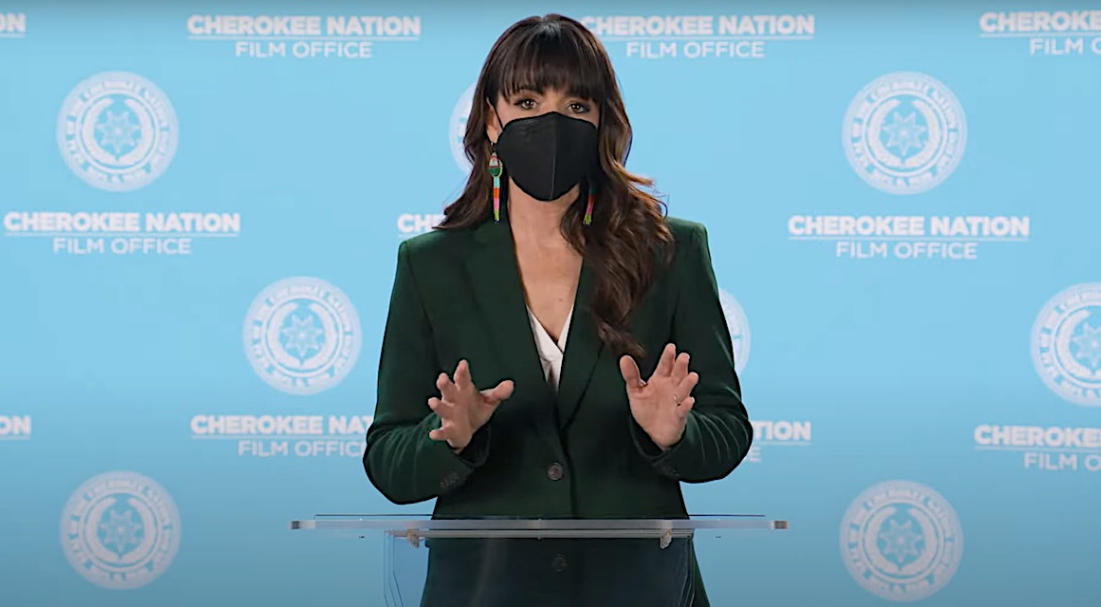
- Details
- By Chuck Hoskin Jr
Guest Opinion. From time immemorial, Cherokee people have shared stories to pass on our history and our values. The tools of storytelling have changed in the modern world, but the need to tell our stories is no less important. By growing the film and television industry within the Cherokee Nation Reservation, we can make sure our stories are seen and heard around the world. And we can be an important part of one of the most promising growth industries in Oklahoma.
In a historic investment, Cherokee Nation recently became the first tribal nation in the United States to provide a film incentive program. The Cherokee Nation Film Office will soon offer up to $1 million in annual cash rebates for qualifying productions filmed on our tribe’s 14-county reservation. Productions can earn a 20 percent cash rebate for qualified expenses, and productions that employ Native American citizens or use Native-owned businesses can boost their rebate to up to 25 percent.
Want more Native News? Get the free daily newsletter today.
Filmmakers can potentially combine the Cherokee Nation Film Incentive with the state of Oklahoma’s incentive, a $30 million annual rebate program signed into law last year.
Oklahoma is already emerging as one of the most desirable states for the film and television industry. This state has a wealth of cultural heritage, a talented workforce and diverse locations. This groundbreaking effort will enable us to take another step forward to making Cherokee Nation a national hub for filmmaking. We are adding the entertainment industry to our diverse mix of profitable businesses successfully operating in northeast Oklahoma, creating good jobs for our citizens and neighbors.
The Cherokee Nation incentive program was designed specifically to support tribal citizens, families and small businesses in local communities.
Many of the crucial positions that make this industry flourish are behind the scenes. That means opportunities for carpenters, electricians, caterers, drivers and other skilled staff. As the industry grows in Cherokee Nation, productions will need many more local staff working in technical and crew jobs. We have a skilled workforce in northeast Oklahoma and educational partners in higher education and Career Tech to grow it even more.

Since launching three years ago, our Cherokee Nation Film Office has made great progress in its mission to increase the presence of Native Americans in the film and television industries. Through scholarships; learning opportunities; a first-of-its-kind Native American talent and crew directory; and partnerships with state and local agencies, universities, nonprofits and other stakeholders, our film office is already making tremendous strides to open doors for Indigenous creatives.
Together, we are changing the narrative about Native peoples and culture. We are correcting many years of misrepresentation and harmful stereotypes. We are bringing diversity and accurate representations of Native identity to the film industry, and we are giving Native writers, directors, actors and other creative talent the chance to share our stories with the world.
The Cherokee Nation Film Incentive is our latest investment in helping prosperous industries flourish in Indian Country. It adds to the dynamic impact of Cherokee Nation’s people, businesses and government. I look forward to seeing good jobs, an economic boost, and new opportunities for our people to shine and thrive.
Chuck Hoskin, Jr. is the principal chief of the Cherokee Nation.
More Stories Like This
The SAVE America Act Threatens Native Voting Rights — We Must Fight BackThe Presidential Election of 1789
Cherokee Nation: Telling the Full Story During Black History Month
Jesse Jackson Changed Politics for the Better
Native News Online at 15: Humble Beginnings, Unwavering Mission
Help us defend tribal sovereignty.
At Native News Online, our mission is rooted in telling the stories that strengthen sovereignty and uplift Indigenous voices — not just at year’s end, but every single day.
Because of your generosity last year, we were able to keep our reporters on the ground in tribal communities, at national gatherings and in the halls of Congress — covering the issues that matter most to Indian Country: sovereignty, culture, education, health and economic opportunity.
That support sustained us through a tough year in 2025. Now, as we look to the year ahead, we need your help right now to ensure warrior journalism remains strong — reporting that defends tribal sovereignty, amplifies Native truth, and holds power accountable.
 The stakes couldn't be higher. Your support keeps Native voices heard, Native stories told and Native sovereignty defended.
The stakes couldn't be higher. Your support keeps Native voices heard, Native stories told and Native sovereignty defended.
Stand with Warrior Journalism today.
Levi Rickert (Potawatomi), Editor & Publisher
